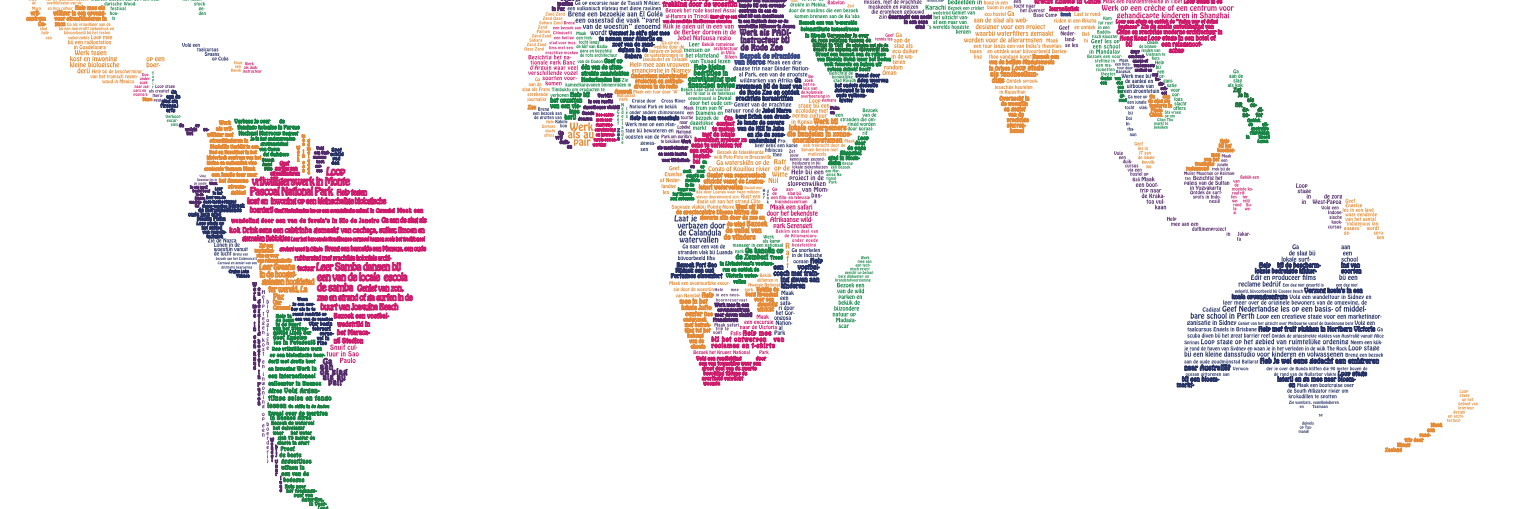Emigration and long stay abroad: questions and answers
What are reasons to move abroad?
- You may be unhappy with all the green spaces disappearing to make room for new houses, the lack of jobs or with society as a whole, that doesn’t always mean emigration is the solution of choice. General dissatisfaction about one’s life and role in society can sometimes be tackled by moving to another part of the country or choosing a more meaningful, satisfying or charitable career.
- Moving abroad doesn’t necessarily have to do with being fed up with everything that’s happening in your own country but it can be a factor in people’s decision to turn their backs on the home country for pastures new. Temporarily or indefinitely.
Reasons to move abroad at a glance
- Wanting to leave your home country;
- Economic circumstances & employment situation;
- The wish to see more of the world, chasing adventure and that long cherished dream;
- Improving one’s quality of life;
- To be able to spend more time with friends and family;
- Following your heart;
- Personal development;
- Security both personal and economic.
What are reasons to (temporarily) postpone the big move?
Despite the large number of people actually taking the leap and emigrating to another country, there’s another big group that postpones the move. Sometimes indefinitely. What are their reasons?
- Selling their house proves more difficult than anticipated resulting in a lack of financial means which then throws a spanner in the works;
- Finding a job or other means of making ends meet is proving slow and difficult;
- Obtaining the correct documentation such as a work or residence permit or medical papers takes longer than expected;
- The nuts and bolts of handing over to your successor or signing over your company to a new owner is more time consuming than anticipated;
- A local qualification course, training or education has not yet been completed;
- Significant life events of your nearest and dearest, such as the birth of a child, kids moving into a new home or health issues of close family members, prevent you from packing up just yet.
All those reasons not to go, postponing the big leap. People trying to convince me to stay. In the end, I followed my guts and managed to, albeit with heavy heart, leave everyone and everything behind. A tough decision at the time, but one I’m incredibly happy with at present.
- Colombia emigrant
In hindsight, I’m really happy I got to give both my parents the palliative care they needed and deserved. It wasn’t until both passed on that my emigration plans came to full fruition. It saved them unnecessary heartache but it definitely also did me a lot of good.
- Canada emigrant
There have been some heated discussions. My husband wants to emigrate sooner rather than later but we agreed we’d stay put until both our kids had graduated. I’m happy that despite the disagreements, we’ve always kept communicating. My husband now spends intermittent time in Portugal to prepare the house and get it ready for us to move in but we won’t move until everyone is ready.
- Portugal emigrant
When our emigration plans started to take shape, all three of our children were still in school. Now we’re just waiting for our daughter to take her final exams. After that, she’s off to college and will move into student accommodation. We’ll give her a few months to settle in and then we’re finally ready for the big move. One of our dear family friends will act as a back-up parent once we’ve left. Because of the cheap flights from Portugal, we’ll be able to come over frequently to make sure our kids are doing well and they’ll be able to jump on a flight whenever they want to see us.
- Portugal emigrant
What proved difficult at times, is that not just long term but also mid-term planning was put on hold. Every decisions seemed to have an effect on our prospective move. Should we fix that wall in our temporary home, take a pet, do some work on the garden, buy study materials for next year? It all caused quite a bit of turmoil.
- Australia emigrant
Changes of finding employment via traditional routes is slim to none. It’s all about your network. So now whilst still working in my country, I make regular visit to Madeira to network, meet people and build and maintain contacts. I learn a lot, specifically from other immigrants who already life and work in Portugal. It won’t be long ‘till I’ll follow suit!
- Portugal emigrant
Is emigration for life?
Technically speaking
Technically it’s usually a no as you can always return to your country of birth. However, it does depend on the country, your citizenship status, your parents’ citizenship and the local rules and regulations concerning emigration.
Psychologically speaking
Matters of the mind can never be as strict as forever.
- People’s decisions are hardly ever irrevocable as we’re generally inclined to and need (regular) change in our lives.
- If you’re being relocated by your employer, it usually implies a temporary arrangement from which you’ll either be send to another country or brought back home.
What to consider when emigrating with children?
- In most cases, children come along when their parents emigrate.
- If your children are still babies or toddlers, moving them should not cause too much instability. Their trusted family unit stays intact and external factors are not yet as important.
- Most children between around eight to ten years old are at a relatively stable developmental stage and will therefore adapt fairly easily to their new environment.
- For teenagers however, a big move can be rather unsettling and can cause quite a bit of turbulence. They lose their friends, their school, their neighbourhood, sports club and everything they know.
- Even though many emigrants feel their big move significantly enriched the life of their children, they do concede that it’s probably beneficial to settle in one place once children hit eleven or twelve.
- Children with developmental or academic issues will have a much harder time settling in to their new environment. It could be beneficial to their development to stay in their own country.
- If children stay behind, it’s important to first organise their living arrangements before making too advanced emigration plans. Once the children are settled, the next steps will be much smoother.
- With older kids, late teens, consider postponing the big move until after children have left the parental home and have set up their own home.
How to prepare your emigration financially?
- Take some time to consider the effect on your finances when planning a move abroad: create a financial plan.
- Prepare an emigration budget, taking into consideration your current financial status and also make projections of different scenarios. See also “the cost of emigration”.
- Research the economic situation in your new country. Are they financially stable, what about inflation, what’s the unemployment like, what is the cost of living?
- Find out about banks, does your bank operate in this country? What’s the process of opening a bank account? Is there anything you can do now to speed things up? Do you need to hold on to your current account, set up online banking, organise international payment options and new credit cards?
- Find a financial and tax consultant, preferably specialised in or with extensive knowledge of the country your moving to. Set up a financial plan including pension and future arrangements for your children’s education Find out about tax rules and regulations, even though your future employer may take care of most things.
- Research local health care and health insurance arrangements. Is it beneficial to set up your own insurance? Are local health insurance packages sufficient? What are the local hospitals and GP surgeries like?
- Research local and international insurance options such as homeowners, liability and legal expenses insurance.
- Find out about protection against online and identity fraud. What are the risks, well known schemes and traps, internet safety, how secure are the banks and ATMs? Are your current precautions adequate?
- Cancel any standing orders well before you leave and double check with your bank which ones are still active. Cancel contracts and check notice periods.
Expats and Emigrants Health Insurances
JoHo Insurances offer the best expat insurance packages from reputable international insurance companies.
International Expat Insurance
- The International Expat Insurances Package consists of several essential coverages, designed in favour of expats and their family members. Professional assistance is offered worldwide when sickness, accident or even death occurs. Assistance is also available in case of loss of income. With this insurance you are completely free to get medical treatment in a hospital of your personal choice. This includes private hospitals.
- Read more about International Expat Insurance
April MyHealth International
- APRIL International Care France, an insurance intermediary, designs, distributes and manages insurance solutions and assistance services for individuals, travelers, expatriates and businesses.
- Read more about April MyHealth International
Globality Health Yougenio
- "Globality Health Yougenio is the international health insurer with a special focus on expatriates. For people who study, travel, and people living and/or working abroad. With more than 80 years of experience in health insurance, we provide our customers the convincing competence of an international network of assistance and service partners. As an integral part of Munich Health, with more than 5,000 experts at 26 locations, we offer healthcare solutions for clients and partners all over the world."
- Read more about Globality Health Yougenio
Allianz International Health Insurance
- The Allianz Worldwide Care International Health Insurance offers a comprehensive coverage for expatriates and their family with a choice of three different levels of cover.
- There are several insurance plans you can choose from. In either way you need to choose one of the four Core plans. Allianz offers an optional deductible for the Core plan. This can be a very high deductible.
- Read more about Allianz International Health Insurance
CIGNA International
- CIGNA International Expatriate Benefits has more than 25 years’ experience and is the world's largest provider of employer-sponsored healthcare benefits. A comprehensive array of flexible products and funding options, coupled with simplified administration, provides coverage for expatriates around the world. And, like many of our customers, we have a local presence in many jurisdictions around the globe, which translates into first-hand knowledge of regional healthcare issues.
- Read more about CIGNA International
Or visit JoHo Expatinsurances.org for more international insurance options and advice


















